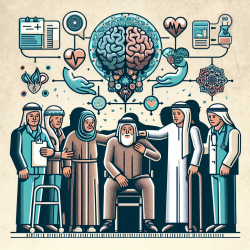Introduction
In the field of speech-language pathology, understanding the broader social and psychological factors that influence help-seeking behaviors can significantly enhance therapeutic outcomes. A recent study titled Men’s Help-Seeking Attitudes in Rural Communities Affected by a Natural Disaster provides critical insights into these behaviors, particularly among men in rural settings post-natural disaster. This research can guide practitioners in tailoring interventions that are not only effective but also culturally and contextually appropriate.
Key Findings
The study, conducted in the Chilean Central Valley, highlights several factors influencing men's help-seeking attitudes:
- Age and Education: Younger men with higher education levels are more likely to seek help.
- Income and Relationships: Those with above-average incomes and stable relationships show a positive inclination towards seeking help.
- Traditional Masculinity: Older men often resist seeking help due to traditional notions of masculinity and negative perceptions of available services.
Implications for Practitioners
Understanding these dynamics can help practitioners in several ways:
- Tailored Interventions: Develop interventions that consider the ecosystemic realities of rural men, focusing on both individual and environmental factors.
- Education and Awareness: Educate clients about the benefits of seeking help and challenge traditional gender norms that discourage help-seeking.
- Service Adaptation: Adapt services to be more accessible and engaging, addressing concerns about confidentiality and professionalism.
Encouraging Further Research
While the study offers valuable insights, it also opens avenues for further research. Expanding the sample size and including diverse geographical areas could validate and extend these findings. Additionally, exploring the role of speech-language pathologists in encouraging help-seeking behaviors could be a fruitful area of study.
Conclusion
The study underscores the importance of adapting interventions to meet the unique needs of men in rural communities. By integrating these insights, practitioners can enhance their practice and contribute to better health outcomes for their clients.
To read the original research paper, please follow this link: Men’s Help-Seeking Attitudes in Rural Communities Affected by a Natural Disaster.










